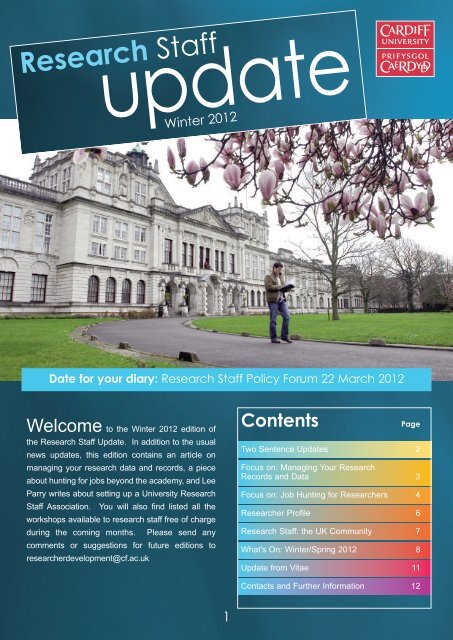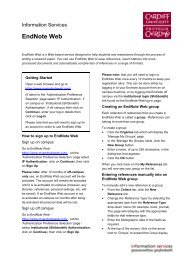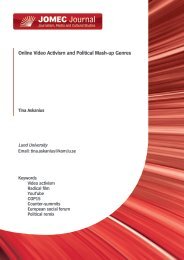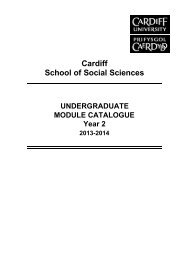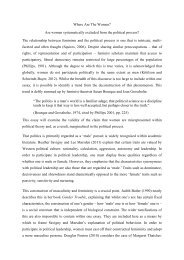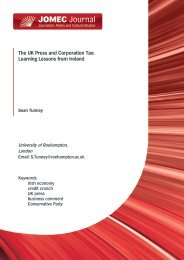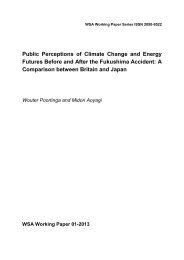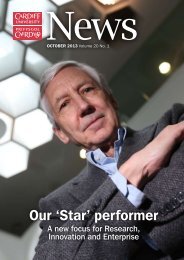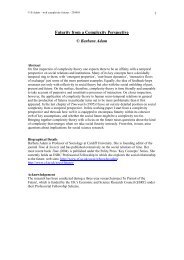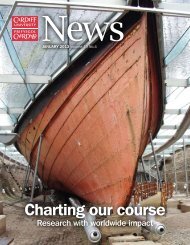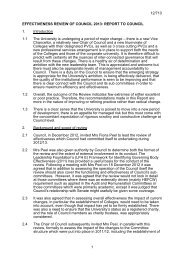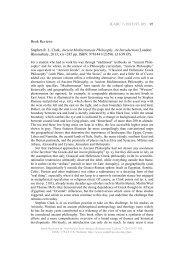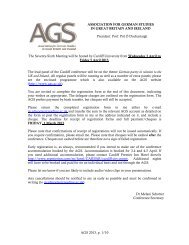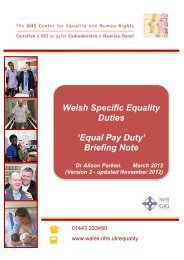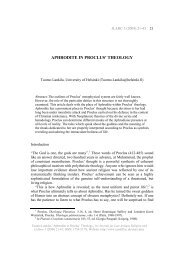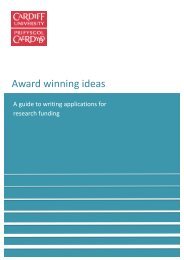Research Staff Update - Winter 2012 - Cardiff University
Research Staff Update - Winter 2012 - Cardiff University
Research Staff Update - Winter 2012 - Cardiff University
You also want an ePaper? Increase the reach of your titles
YUMPU automatically turns print PDFs into web optimized ePapers that Google loves.
update<br />
<strong>Research</strong> <strong>Staff</strong><br />
<strong>Winter</strong> <strong>2012</strong><br />
Date for your diary: <strong>Research</strong> <strong>Staff</strong> Policy Forum 22 March <strong>2012</strong><br />
Welcome to the <strong>Winter</strong> <strong>2012</strong> edition of<br />
the <strong>Research</strong> <strong>Staff</strong> <strong>Update</strong>. In addition to the usual<br />
news updates, this edition contains an article on<br />
managing your research data and records, a piece<br />
about hunting for jobs beyond the academy, and Lee<br />
Parry writes about setting up a <strong>University</strong> <strong>Research</strong><br />
<strong>Staff</strong> Association. You will also find listed all the<br />
workshops available to research staff free of charge<br />
during the coming months. Please send any<br />
comments or suggestions for future editions to<br />
researcherdevelopment@cf.ac.uk<br />
1<br />
Contents Page<br />
Two Sentence <strong>Update</strong>s 2<br />
Focus on: Managing Your <strong>Research</strong><br />
Records and Data 3<br />
Focus on: Job Hunting for <strong>Research</strong>ers 4<br />
<strong>Research</strong>er Profile 6<br />
<strong>Research</strong> <strong>Staff</strong>: the UK Community 7<br />
What's On: <strong>Winter</strong>/Spring <strong>2012</strong> 8<br />
<strong>Update</strong> from Vitae 11<br />
Contacts and Further Information 12
Two Sentence <strong>Update</strong>s<br />
<strong>Cardiff</strong> <strong>University</strong> <strong>Research</strong><br />
<strong>Staff</strong> Association (CURSA)<br />
Plans to set up a <strong>Cardiff</strong> <strong>University</strong> <strong>Research</strong><br />
<strong>Staff</strong> Association are currently being realised, as<br />
outlined on page 7. This new <strong>University</strong> body will<br />
allow researchers to make their voices heard; not<br />
only within the <strong>University</strong>, but also at a national<br />
level to funders and policy makers through<br />
representatives in the South West and Wales<br />
<strong>Research</strong> <strong>Staff</strong> Association (SWWRSA) and the<br />
UK <strong>Research</strong> <strong>Staff</strong> Association (UKRSA).<br />
<strong>Staff</strong> Survey<br />
The staff survey closed on 11th November with a<br />
57% response rate. Preliminary results will be<br />
published in February, shortly followed by a<br />
<strong>University</strong> action plan to address the points<br />
raised.<br />
<strong>Research</strong>er Development<br />
Framework<br />
Vitae has published for consultation four ‘lenses’<br />
designed to help pinpoint the skills, knowledge<br />
and behaviours that can be acquired or used by<br />
researchers in enterprise, information literacy,<br />
intrapreneurship, leadership, and teaching<br />
contexts. These lenses complement Vitae’s<br />
other RDF resources, such as the RDF<br />
Professional Development Planner, all of which<br />
are available on the Vitae website at<br />
www.vitae.ac.uk/rdf.<br />
2<br />
<strong>Research</strong> Excellence<br />
Framework (REF)<br />
The <strong>University</strong> launched its REF recruitment<br />
campaign, ‘Serious Brain Power’, at the end of<br />
October 2011. In early <strong>2012</strong> the <strong>University</strong> will<br />
publish its Equality and Diversity Code of<br />
Practice, which will provide clarification about<br />
how the <strong>University</strong> will select staff to include in its<br />
REF submission.<br />
<strong>Research</strong> <strong>Staff</strong> Policy Forum<br />
The <strong>2012</strong> <strong>Research</strong> <strong>Staff</strong> Policy Forum will be<br />
held on the 22nd March <strong>2012</strong>. As with previous<br />
policy fora, this lunchtime event will give research<br />
staff the opportunity to get together and learn<br />
about, and influence, key developments within<br />
the <strong>University</strong> and beyond.<br />
Welsh Crucible<br />
Following the success of 2011’s pilot programme,<br />
the Vice Chancellors of the St David’s Day Group<br />
have agreed to fund a second Welsh Crucible<br />
programme in <strong>2012</strong>. The call for applications will<br />
be open until 24th February <strong>2012</strong>.<br />
Stonewall Workplace<br />
Equality Index <strong>2012</strong><br />
<strong>Cardiff</strong> <strong>University</strong> has been ranked at 49 in<br />
Stonewall’s Top 100 LGB-friendly employers in<br />
the UK. This recognises efforts by the <strong>University</strong>,<br />
and specifically Enfys (the staff LGBT+ network),<br />
to improve support for LGBT members of staff.
Focus on:<br />
Managing<br />
Your <strong>Research</strong><br />
Records and Data<br />
Do you ever have problems finding the information you need in your electronic folders? Is your office<br />
overflowing with paper, or your hard drive full to capacity? Are you uncertain about how long you need to keep<br />
your records, or who should be allowed to access them? The Governance & Compliance Division has just<br />
published updated guidance aimed to help researchers to manage their research records and data to ensure<br />
that they are reliable, secure and available when needed. The guidance (which is available at<br />
http://www.cardiff.ac.uk/govrn/cocom/recordsmanagement/guidanceleaflets/index.html provides detailed advice<br />
on everything including what records to keep, where to store your records and data, selecting the best file<br />
formats to ensure future accessibility, who to provide access to, what security measures to take and how long<br />
to keep your records and data.<br />
The effective management of research data and records is an integral part of good research practice. The<br />
creation, maintenance and appropriate retention of accurate data and records can strengthen the reliability of<br />
your research evidence, enable you to demonstrate good research practice and protect you and the <strong>University</strong><br />
against allegations of research misconduct. The fast pace of software and hardware development and the<br />
fragility of digital media also means that research records need to be actively managed from their creation to<br />
ensure that they are accessible for as long as necessary.<br />
If you would like a more detailed introduction to managing research records as well as information on the Data<br />
Protection obligations surrounding collecting and managing research records and data, the Governance &<br />
Compliance Division runs a training session on Managing <strong>Research</strong> Records through the HR <strong>Staff</strong> Development<br />
programme, for further details please see the <strong>Staff</strong> Development Programme:<br />
http://www.cardiff.ac.uk/humrs/training/programme/index.html<br />
The <strong>University</strong> also has specific procedures for managing records from clinical trials which are available in the<br />
<strong>University</strong> Archiving Standard Operating Procedures available at:<br />
http://www.cardiff.ac.uk/racdv/resgov/forms/forms-procedures-sops-and-guidelines.html<br />
3<br />
Image courtesy of Sheela Mohan<br />
Sarah Phillips, <strong>University</strong> Records Manager<br />
Coming Soon: Managing <strong>Research</strong> Data: 20 March <strong>2012</strong>
Focus on: Job Hunting for <strong>Research</strong>ers<br />
Josie Grindulis, Career Development Manager for <strong>Research</strong> <strong>Staff</strong><br />
Whether you are looking for your first “serious” job outside<br />
your studies or research work within the <strong>University</strong> sector,<br />
something to fill the gap while you decide on your next<br />
move, or a return to other employment sectors, there are<br />
some key issues to address that will help you in your<br />
job hunt.<br />
Top tips<br />
Attitude<br />
• Getting a job is a job in itself so don’t expect that<br />
jobs will come to you. Treat getting a job as a<br />
research project with an intended outcome, but with<br />
room for discoveries so you are ready to take up<br />
opportunities. An effective job hunt needs a<br />
consistent, focused approach rather than bursts of<br />
frantic activity.<br />
• Be positive about your achievements to date and your<br />
potential for the future. Highly qualified and skilled<br />
people like you are very employable. Successful<br />
people do change focus and skills do transfer.<br />
Key Resources<br />
<strong>Cardiff</strong> <strong>University</strong> sources<br />
The Careers and Employability’s own vacancy site<br />
http://www.cardiff.ac.uk/carsv/students/findingajob/jobspa<br />
ges/ index.html with national, local jobs and work<br />
experience opportunities which include Go Wales<br />
vacancies. For local jobs see the ‘Finding local (Wales)<br />
vacancies’ handout downloadable from the website.<br />
http://www.cardiff.ac.uk/carsv/students/resources<br />
destinations/index.html. The “Getting Started” series of<br />
leaflets (also downloadable) covering most subjects eg.<br />
Chemistry, which gives advice and lists, targeted websites<br />
and Professional bodies.<br />
National Graduate level (and<br />
above) sources<br />
Opportunities Outside Academic <strong>Research</strong>.<br />
• Prospects Directory http://www.prospects.ac.uk/<br />
• TARGETjobs http://targetjobs.co.uk/ for their GET<br />
directory and occupational series, eg. Engineering.<br />
• Inside careers http://www.insidecareers.co.uk/ with<br />
specialist sections on Business and Management, City and<br />
Finance, Engineering and Technology and Patent work.<br />
• Opportunities http://www.opportunities.co.uk/ for<br />
public sector jobs<br />
• The http://www.jobs.ac.uk/ site best known for<br />
academic jobs also has professional,managerial and<br />
support jobs in higher education.<br />
4<br />
• Seek support from friends, family, Principal<br />
Investigators, and Careers and Employability or<br />
Human Resources staff. Whatever job you are looking<br />
for it will be a change from your current role and<br />
routine, and you don’t have to do it all on your own.<br />
Your Employability<br />
Start with an honest review of yourself, your skills,<br />
knowledge and experience. Take a look at the Careers<br />
and employability booklet “Are you Employable?” and Key<br />
Resources below. The most common gaps commented on<br />
by researchers are:<br />
• Work experience (paid or voluntary)<br />
• Commercial Awareness.<br />
Identifying Vacancies<br />
Advertised Jobs – the visible jobs market.<br />
There is a large array of sources and contacts at the Careers<br />
and Employability Centre most of which are also available<br />
online. These contacts are all employers who wish to recruit<br />
at graduate level or above. Starting with these sources can<br />
help to prevent you getting lost in ‘Monster.com’ and similar<br />
sites and wasting time.<br />
Newspaper sites and professional<br />
publications<br />
• Each employment sector and occupation has specific<br />
sources that it uses for recruitment so make sure you find<br />
out which ones are best for your area. For example The<br />
Guardian http://jobs.guardian.co.uk/ has sections<br />
including Environment and Education.<br />
• The website http://www.totalprofessions.com/home<br />
has links to over 270 professional bodies including the<br />
Institute of Physics whilst the Real Jobs site has<br />
http://www.realworldmagazine.com/magazines<br />
articles on a range of topical matters including the<br />
2011/12 issue on Diversity<br />
VITAE website<br />
Includes a section dealing with career opportunities<br />
outside Higher education http://www.vitae.ac.uk/<br />
researchers/1335/Career-opportunities-outside-highereducation.html<br />
and links to occupational information<br />
Using Recruitment Agencies<br />
Recruitment agencies can be a helpful part of your job<br />
hunting strategy. See the Careers and Employability<br />
booklet “Recruitment Agencies” http://www.cardiff.ac.uk/<br />
carsv/students/resourcesdestinations/booklets/index.<br />
html which includes local <strong>Cardiff</strong> agencies.
Identifying Opportunities<br />
. . . in the Not So Visible Jobs Market<br />
Recruitment events<br />
<strong>Research</strong>er Development, Graduate College and Careers<br />
and Employability run events each academic year at<br />
which you can engage with employers. Some are themed<br />
fairs like the ‘Engineering and Technology’ fairs or more<br />
general like ‘Autumn Careers Fair ‘and ‘Graduate Careers<br />
Fair in summer’.<br />
http://www.cardiff.ac.uk/carsv/newsandevents/index.html.<br />
Employers attend these events targeting <strong>Cardiff</strong><br />
graduates and postgraduates and offer contact<br />
opportunities for those less regularly advertised jobs,<br />
whilst others are more ‘exploration’ events for<br />
researchers. The ‘Exploring Career Options Beyond<br />
Academia’ series offers the opportunity to gather industry<br />
information and to network with experienced<br />
professionals.<br />
Social media<br />
The use of social media for getting a job and for<br />
professional development has become established as a<br />
mainstream method. Jobvite Social Recruiting Survey<br />
2010 showed that 92% of recruiters surveyed were<br />
planning to use social media as part of their recruitment<br />
mix. LinkedIn is the most favoured followed by Facebook<br />
and Twitter. If you have no social media presence why not<br />
dip in a toe with LinkedIn but keep it professional.<br />
Labour market information<br />
Careers and Employability produce an “Employer<br />
information” handout<br />
http://www.cardiff.ac.uk/carsv/students/resourcesdestinati<br />
ons/booklets/index.html and each “Getting Started”<br />
handout gives links to relevant sources for specific<br />
employment areas. This information can assist your<br />
understanding of the geographical spread, employer sizes<br />
and the state of competition.<br />
5<br />
Diversity<br />
The Careers and Employability Resources Centre<br />
(formerly the Careers Library) has a number of<br />
publications for people who may feel at a disadvantage in<br />
the career planning or job selection process, and the<br />
website provides relevant links and resources<br />
http://www.cf.ac.uk/carsv/students/diversitygroups/index.html<br />
One-to-one advice and Guidance<br />
For help with your job hunt strategy book on line for a<br />
Career Consultation, with Josie Grindulis Career<br />
Development Manager. www.cardiff.ac.uk/carsv<br />
Temporary use of Telephone Bookings<br />
The Careers and Employability Booking system is going<br />
through a change on the website, so until further notice<br />
bookings for Career Consultations for research staff with<br />
Josie Grindulis will need to be made by telephoning Lisa<br />
at Careers and Employability on 029 20874227 or internal<br />
ext 74227. Apologies for any inconvenience.
<strong>Research</strong> <strong>Staff</strong> <strong>Update</strong><br />
I completed my undergraduate degree in Physics at Athens<br />
<strong>University</strong>, Greece, and my Master’s degree in Space<br />
Physics & Astronomy at Rice <strong>University</strong>, USA. I arrived in<br />
<strong>Cardiff</strong> in 2000 to carry out my PhD in theoretical star<br />
formation, which I finished in 2003, and since then I have<br />
been employed at the university as a <strong>Research</strong> Associate,<br />
funded by the Science & Technology Facilities Council. The<br />
goal of my research is to explore the physical processes that<br />
lead to the formation of stars and planets in the universe.<br />
The <strong>Cardiff</strong> Star Formation Group is among the world<br />
leaders in star formation and my stay here has been very<br />
exciting. The main focus of my research has been to<br />
construct advanced computer models to simulate how<br />
interstellar gas collapses to form stars, under the influence<br />
of gravity. Moreover, I compare the results of my<br />
simulations with observations. This is a very flourishing field<br />
and new observations from state-of-the-art telescopes<br />
challenge our understanding and initiate the development<br />
of new theories.<br />
I have presented my work in many international<br />
conferences and I co-organised two conferences in <strong>Cardiff</strong>.<br />
Last year I participated in one the “Frontiers of Science”<br />
meetings organised by the Royal Society in Brazil, and I<br />
was one of only three UK “outstanding early-career”<br />
<strong>Research</strong>er Profile<br />
Dimitris Stamatellos<br />
School of Physics and Astronomy<br />
6<br />
astronomers invited. I have established collaborations with<br />
other astronomy groups in Germany, France and other<br />
European countries. Recently, I received an award to start<br />
a collaboration with Beijing <strong>University</strong> in China. I enjoy<br />
travelling, meeting new people, and getting to know new<br />
cultures and I feel very lucky that that my chosen career<br />
gives me these opportunities.<br />
Parallel to my research, in the last three years I have had<br />
the opportunity to engage with teaching activities within<br />
my department and also to supervise undergraduate<br />
students. This has added another dimension to my<br />
working life in <strong>Cardiff</strong>.<br />
I hope to secure a permanent academic position either in<br />
<strong>Cardiff</strong> or elsewhere so that I can continue doing what I<br />
love. I am also applying for advanced fellowships (from<br />
STFC and the EU) that will help me establish an<br />
independent research programme.<br />
I spend most of my free time playing with my two children<br />
and getting amazed by how fast they can learn new things.<br />
When they fall asleep I enjoy reading historical novels.<br />
I have enjoyed my stay in <strong>Cardiff</strong> and I am looking forward<br />
to more excitement in the coming years!
<strong>Research</strong> <strong>Staff</strong>:<br />
the UK Community<br />
It has been a productive period for <strong>Cardiff</strong> <strong>University</strong> RS and the UKRSA since the last RS <strong>Update</strong> in May. In<br />
the last instalment I highlighted the UKRSA ‘communities’ and ‘funding analysis’ projects, which I am pleased<br />
to say have made great progress in the interim period.<br />
Communities<br />
The ‘communities’ project has made great strides forward<br />
in <strong>Cardiff</strong> and in Wales. It aims to encourage research<br />
staff to get together to form a cohesive voice for putting<br />
their issues, views and ideas across to relevant<br />
organisations. I am pleased to report that the School of<br />
Psychology has a functioning <strong>Research</strong> <strong>Staff</strong> Association<br />
with researchers now having representatives recognised<br />
by the school. If any other research staff would like help<br />
to setup a RSA see the guides on the UKRSA website<br />
(ukrsa.org.uk) or contact me.<br />
<strong>Cardiff</strong> <strong>University</strong> <strong>Research</strong> <strong>Staff</strong><br />
Association (CURSA)<br />
In the last instalment I reported the intention to form a<br />
CURSA for communicating and listening to the <strong>University</strong>,<br />
which had received the full, formal backing of the Pro-Vice<br />
Chancellor (PVC) for <strong>Staff</strong>, Prof Terry Threadgold. There<br />
is now an embryonic CURSA across the <strong>University</strong>. As a<br />
result of the email I sent inviting all research staff to form<br />
a CURSA, I have had replies from researchers in the<br />
schools of Business, Chemistry, Dentistry, History, Law,<br />
Medicine, Optometry, Psychology and Social Sciences. In<br />
the coming weeks we will hold a meeting to formally<br />
establish CURSA: if researchers from other schools are<br />
interested in getting involved then please contact me.<br />
The (as yet unelected) chair of CURSA would be the ideal<br />
person to sit on the newly formed <strong>Research</strong> Strategy<br />
Oversight Group. This group will meet to approve the<br />
annual revisions to the implementation plan for the<br />
university's <strong>Research</strong> Strategy. This group will comprise:<br />
Pro Vice Chancellor for <strong>Research</strong> (Professor Graham<br />
Hutchings) (chair), 3 x Deputy Pro Vice Chancellors for<br />
<strong>Research</strong>, 2 x Council members, 1 x Dean of<br />
Postgraduate Studies, 1 x <strong>Research</strong> Student member, 1 x<br />
<strong>Research</strong> staff member, 2 x Heads of School and 2 x<br />
Directors of <strong>Research</strong>. Until CURSA is formed I will attend<br />
these meetings on behalf of research staff and report back<br />
via RS <strong>Update</strong>.<br />
Lee Parry<br />
School of Biosciences and UKRSA Representative<br />
7<br />
South West & Wales <strong>Research</strong> <strong>Staff</strong><br />
Association (SWW-RSA)<br />
In December researchers from our region who attended<br />
the Vitae <strong>Research</strong> <strong>Staff</strong> Conference held a meeting to<br />
discuss the formation of a regional RSA. The researchers<br />
there agreed to become a vessel for the research staff at<br />
their HEI to bring their ideas and opinions to the chair of<br />
the SWW-RSA, who can in turn inform the UKRSA. The<br />
Chair of the SWW-RSA will also listen to the views and<br />
opinions of any researchers in the region who do not have<br />
active RSAs through which they can report.<br />
UKRSA & Vitae <strong>Research</strong> <strong>Staff</strong><br />
Conference December 2011<br />
This year’s conference was held in the Queens Hotel,<br />
Leeds and, as hoped, attracted far more researchers from<br />
the north of the UK than in previous years. As may be<br />
expected, researchers raised the same issues which are<br />
commonly heard at these conferences; such as shorttermism,<br />
funding and low pay. All of these issues were also<br />
recently summarised in a recent report from the grassroots<br />
campaigning organisation Science is Vital. The chair of<br />
SiV (scienceisvital.org.uk), the author and scientist Dr<br />
Jenny Rohn (www.jennyrohn.com), was the plenary<br />
speaker this year and offered some interesting insights into<br />
their dealings with Westminster on science funding.<br />
Project: <strong>Research</strong> Funding, Scoping the data<br />
I ran a workshop at the Conference on the UKRSA project<br />
examining research funding which I have led this year.<br />
Briefly, I reported that currently the UK leads the world in<br />
research output, therefore if researchers want the funders<br />
and policy-makers to change the system then they will<br />
have to present a very convincing argument as to how<br />
things can be even better. To support such an argument I<br />
have been looking at collecting data to support the<br />
common complaints that RS have. My conclusions were<br />
that solid, irrefutable data to support these complaints do<br />
not currently exist; the next step will be to suggest ways<br />
for trying to collect these data.<br />
If anyone wants more information on any of the items reported here<br />
please feel free to contact me on parryl3@cardiff.ac.uk.
What’s On: <strong>Winter</strong>/Spring <strong>2012</strong><br />
The following provides a summary of workshops offered by Organisational and <strong>Staff</strong><br />
Development and the <strong>University</strong> Graduate College during <strong>Winter</strong>/Spring <strong>2012</strong>.<br />
Support for New Members of Academic <strong>Staff</strong><br />
Induction Seminar for New Members of Academic <strong>Staff</strong> March 1(full) & 2<br />
Domain A: Knowledge and Intellectual Abilities<br />
Information Management<br />
Accessing Archives – Glamorgan Records Office<br />
EndNote: Managing Your References<br />
Keeping Your <strong>Research</strong> Up-to-date<br />
Patent Searching on the Internet<br />
Rapid Reading<br />
8<br />
February 29<br />
March 9<br />
March 7<br />
February 13<br />
February 2<br />
Technical and <strong>Research</strong> Skills Advanced <strong>Research</strong> Computing<br />
Advanced <strong>Research</strong> Computing: Introduction to Condor<br />
April 5<br />
Advanced <strong>Research</strong> Computing: Introduction to Merlin (Session 2)<br />
February 20<br />
Advanced <strong>Research</strong> Computing: Introduction to Merlin (Session 3)<br />
April 19<br />
Technical and <strong>Research</strong> Skills Introductory Workshops<br />
Statistics for Beginners (Day 1)<br />
Statistics for Beginners (Day 2)<br />
Statistics for Beginners (Day 3)<br />
Technical and <strong>Research</strong> Skills IT Skills<br />
C++ for Beginners (Day 1)<br />
C++ for Beginners (Day 2)<br />
C++ for Beginners (Day 3)<br />
Java: Advanced<br />
LaTeX for Beginners (Day 1)<br />
LaTeX for Beginners (Day 2)<br />
MATLAB: An Introduction (Day 1)<br />
MATLAB: An Introduction (Day 2)<br />
MATLAB: An Introduction (Day 3)<br />
UNIX/LINUX: An Introduction<br />
April 16<br />
April 23<br />
April 30<br />
February 29<br />
March 6<br />
March 26<br />
February 22<br />
February 9<br />
February 10<br />
April 2<br />
April 3<br />
April 4<br />
February 6
Technical and <strong>Research</strong> Skills Other (Humanities& Social Sciences)<br />
Pre-modern Materials & Textual Sources<br />
February 10<br />
Quantitative <strong>Research</strong> for Qualitative <strong>Research</strong>ers<br />
April 30<br />
Technical and <strong>Research</strong> Skills Other (Sciences)<br />
An Introduction to Practical Flow Cytometry March 8<br />
Technical and <strong>Research</strong> Skills Packages<br />
Qualitative Analysis Software: An Introduction<br />
Qualitative Analysis Software: Atlas.ti<br />
Qualitative Analysis Software: Nvivo<br />
Qualitative Analysis Software: Follow-up<br />
Using the Bristol Online Survey Tool<br />
Technical and <strong>Research</strong> Skills Techniques<br />
Deliberative Methods<br />
Exploratory Data Analysis: Follow-on<br />
Geographic Information Systems (GIS)<br />
Mixed Methods in Social Science <strong>Research</strong><br />
Domain B: Personal Effectiveness<br />
Career Management<br />
Academic Jobs in the EU<br />
CVs & Applications (Session 5)<br />
CVs & Applications (Session 6)<br />
CVs & Applications (Session 7)<br />
Exploring Career Options Beyond Academia (Biological & Health Sciences)<br />
Developing an Academic Career in the Humanities/Social Sciences<br />
Job Interviews (Session 5)<br />
Job Interviews (Session 6)<br />
Job Interviews (Session 7)<br />
Your Employment Rights: Fixed-Term Employment<br />
Your Employment Rights: Probation, Appraisal & Career Development for <strong>Research</strong>ers<br />
Personal Development<br />
Assertiveness Skills<br />
Confident Speaking at Meetings<br />
Maximise Your Memory<br />
Time Management<br />
9<br />
February 24<br />
March 16<br />
March 23<br />
July 20<br />
February 24<br />
March 6<br />
March 29<br />
February 2<br />
April 30<br />
February 24<br />
February 13<br />
March 19<br />
April 13<br />
March 8<br />
March 14<br />
February 13<br />
March 19<br />
April 13<br />
March 30<br />
April 4<br />
February 7<br />
February 2<br />
April 19<br />
April 17
Domain C: <strong>Research</strong> Governance and Organisation<br />
Finance, Funding and Resources<br />
Finance for Non-Financial Managers<br />
Finding Funding: <strong>Research</strong>Professional<br />
Getting Grant Funding (Session 2)<br />
Getting Grant Funding (Session 3)<br />
Professional Conduct<br />
An Introduction to the Human Tissue Act<br />
Intellectual Property & Copyright: Understanding Your Rights & the Rights of Others<br />
<strong>Research</strong> Ethics in Social Science <strong>Research</strong><br />
Project Management<br />
10<br />
March 13<br />
February 13<br />
February 10<br />
March 23<br />
Managing <strong>Research</strong> Projects February 3<br />
Domain D: Engagement, Influence & Impact<br />
Communication and Dissemination<br />
Book Reviews (Humanities & Social Sciences)<br />
Conference Posters (Session 1)<br />
Conference Posters (Session 2)<br />
Getting Published<br />
Pronunciation Skills: Individual Consultations<br />
Publishing a Journal Article in the Social & Economic Sciences (Session 2)<br />
The Publisher’s Perspective<br />
Engagement and Impact<br />
Consultancy Skills for <strong>Research</strong>ers: An Introduction<br />
Organising a Conference<br />
The Enterprising <strong>Research</strong>er<br />
TV Documentary Making and Knowledge Transfer<br />
Teaching and Learning<br />
Accreditation as a Teacher in Higher Education<br />
Designing Activities for Online Learning<br />
Information Session for <strong>Research</strong> Degree Supervisors (Session 1)<br />
Information Session for <strong>Research</strong> Degree Supervisors (Session 2)<br />
Lecturing Skills<br />
Small Group Teaching<br />
<strong>Research</strong> Environment<br />
Refereeing for Academic Journals (Humanities & Social Sciences) (Session 2)<br />
Refereeing for Academic Journals (Humanities)<br />
February 16<br />
February 3<br />
February 15<br />
March 15<br />
February 21<br />
March 28<br />
March 5<br />
February 8<br />
April 10<br />
April 27<br />
April 24<br />
March 5<br />
February 21<br />
February 22<br />
February 23<br />
February 24<br />
February 6<br />
April 19<br />
February 6<br />
April 19<br />
April 3<br />
February 28
<strong>Update</strong> from Vitae<br />
Anne Goodman, South West & Wales (SWW) Hub Manager<br />
New Year – New Start?<br />
Got the January blues? Who hasn’t? Who wouldn’t rather<br />
be hibernating and eating the stores we have<br />
hunted/gathered over the last few months?<br />
Since that is not an option for most of us (more’s the pity)<br />
what about trying to shake off the ennui, look forward and<br />
take a fresh look at your career development? How are<br />
you going to develop and change this year? What are you<br />
going to do this year to improve your working life?<br />
As ever, I am going to point you in the direction of the Vitae<br />
website – where on the <strong>Research</strong> <strong>Staff</strong> blog, Elizabeth<br />
Dodson has decided after seven years of university<br />
research, to make a change. She is moving to a<br />
management post working both with universities and<br />
industry, collaborating within a new EPSRC research<br />
centre and she started to take small steps towards this, at<br />
this time next year – read it and be inspired.<br />
But what if you don’t know where your next move is going<br />
to be? If you are looking for inspiration, Vitae has just<br />
published a new online resource for researchers as well as<br />
researcher developers, on the career destinations of<br />
doctoral graduates providing:<br />
• in-depth analysis of the fifteen main employment<br />
sectors for doctoral graduates, including the current<br />
state of the industry, future projected trends, the roles<br />
that doctoral graduates have taken up in each sector<br />
in recent years and useful resources, including key<br />
employers within the sector<br />
• profiles on sixty of the most common occupations for<br />
doctoral graduates, including numbers of doctoral<br />
graduates entering these jobs, a brief explanation of<br />
what the role entails, entry requirements, typical<br />
salaries and useful links<br />
• information highlighting the career paths and<br />
destinations which researchers from individual<br />
disciplines and subjects have followed<br />
• advice on using labour market information to assist<br />
with your career plan<br />
Go to www.vitae.ac.uk/lmi<br />
And finally, if you feel that this is the year where you step<br />
up as a leader – why not take a look at The Leading<br />
<strong>Research</strong>er – the latest in the popular researcher booklets.<br />
This is full of top tips with sections on:<br />
11<br />
• How to be an authentic leader<br />
• How to create the future<br />
• Task, team and individual<br />
• How to influence from any position<br />
• Teams aren’t what they used to be<br />
• How to remain connected and objective<br />
• ’If you can keep your head…’<br />
• Leadership and you<br />
You might like to know that the Vitae SWW Hub ran a<br />
three day residential course called Leadership in Action<br />
which was attended by researchers from <strong>Cardiff</strong><br />
<strong>University</strong>. There will be an opportunity to attend a<br />
national course in the Autumn – register your interest on<br />
the Vitae website.<br />
Essential date for your diary<br />
April 18 - The Victoria Rooms, <strong>University</strong> of Bristol,<br />
reSEARCH careers: ideas, information, inspiration, Vitae<br />
SWW Hub Regional <strong>Research</strong>ers Employability Event:<br />
• want to hear from researchers who are working in a<br />
range of jobs?<br />
• pick up tips and techniques for your job search?<br />
• meet employers?<br />
The Vitae SWW Hub, working with <strong>Cardiff</strong> <strong>University</strong>, and<br />
other HEIs in the region will be holding this FREE one day<br />
event for researchers from the South West and Wales<br />
Region. Register your interest in attending by emailing<br />
swwhub@vitae.ac.uk with ‘<strong>Research</strong>ers Employability Event’<br />
in the title.<br />
And cheer up – we have apparently passed the most<br />
depressing day of the year – the only way is up!<br />
Vitae (www.vitae.ac.uk) provides resources,<br />
advice, information and fora for postdoctoral and<br />
other research staff who are interested in their<br />
personal, professional and career development.<br />
It is a national organisation supported by the<br />
<strong>Research</strong> Councils UK (RCUK).<br />
The South West & Wales Hub of Vitae is hosted by<br />
<strong>Cardiff</strong> <strong>University</strong> – see www.vitae.ac.uk/swwhub<br />
or contact Anne at swwhub@vitae.ac.uk.
Contacts and Further Information<br />
For information about training and career development opportunities at <strong>Cardiff</strong>, to comment<br />
on any aspect of this publication, or to contribute suggestions for future publications, please<br />
contact the researcher development team at researcherdevelopment@cf.ac.uk.<br />
<strong>Research</strong>er Development Team:<br />
Sara Williams<br />
Training & Development<br />
Manager (<strong>Research</strong>)<br />
WilliamsS8@cf.ac.uk<br />
02920 879010<br />
Josie Grindulis<br />
Career Development<br />
Manager<br />
Grindulis@cf.ac.uk<br />
02920 879390<br />
12<br />
Christian Gillard<br />
Training & Development<br />
Administrator<br />
researcherdevelopment@cf.ac.uk<br />
02920 874895<br />
Visit the research staff webpages at www.cardiff.ac.uk/researchstaff<br />
<strong>University</strong> Graduate College<br />
<strong>University</strong> Graduate College Office<br />
60 Park Place<br />
Cathays<br />
<strong>Cardiff</strong><br />
CF10 3AT<br />
Telephone: +44(0)29 2087 9408<br />
Fax: +44(0)29 2087 0186<br />
Email: <strong>University</strong>GraduateCollege@cardiff.ac.uk<br />
Find out more about…<br />
<strong>Cardiff</strong> <strong>University</strong> REF<br />
Recruitment Campaign<br />
Concordat Implementation<br />
Records Management<br />
<strong>Research</strong>er Development Framework<br />
<strong>Research</strong> Excellence Framework<br />
UKRSA<br />
Welsh Crucible<br />
Enfys<br />
www.cf.ac.uk/seriousbrainpower<br />
…at a UK level<br />
www.researchconcordat.ac.uk<br />
…within <strong>Cardiff</strong> <strong>University</strong><br />
www.cf.ac.uk/researchstaff<br />
http://www.cardiff.ac.uk/govrn/cocom/recordsmanagement/recordsmanagement.html<br />
www.vitae.ac.uk/rdf<br />
www.hefce.ac.uk/ref<br />
www.vitae.ac.uk/ukrsa<br />
www.welshcrucible.org.uk<br />
http://www.cardiff.ac.uk/govrn/cocom/equalityanddiversity/sexualorientation/l<br />
gbtstaffnetwork/lgbt-staff-network.html


